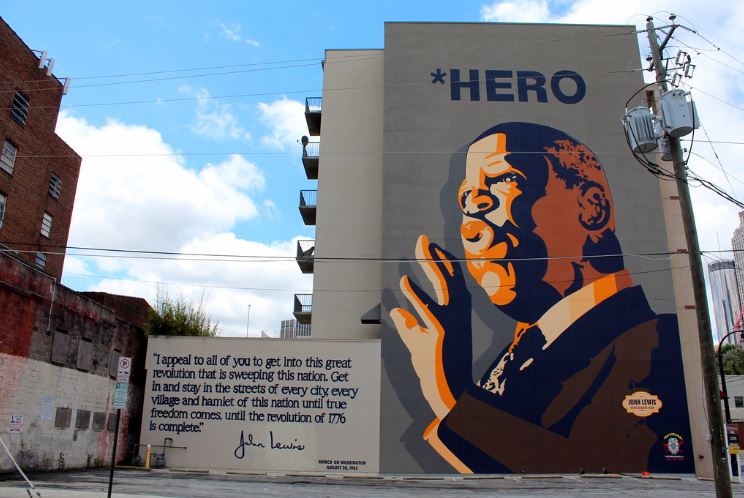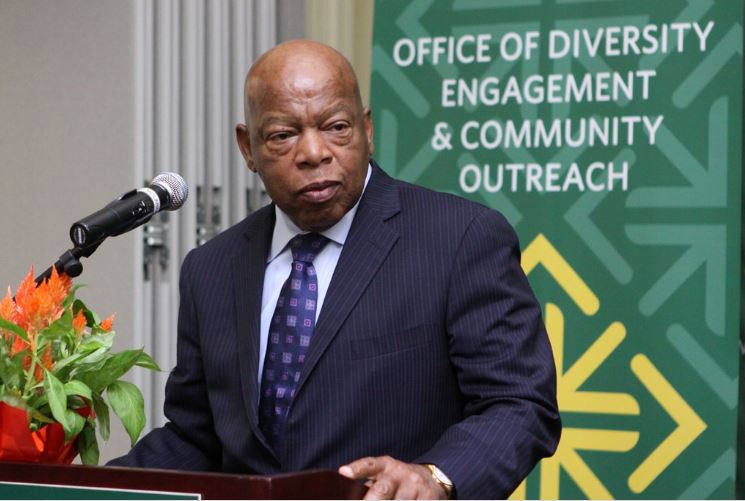
“Atlanta – Sweet Auburn: John Lewis Mural” by wallyg is licensed under CC BY-NC-ND 2.0. To view a copy of this license, visit https://creativecommons.org/licenses/by-nd-nc/2.0/jp/?ref=openverse.

“Congressman John Lewis 2016 USFCA – 13” by shawncalhoun is licensed under CC BY-NC 2.0. To view a copy of this license, visit https://creativecommons.org/licenses/by-nc/2.0/?ref=openverse.
For our final Black History Month post, we wanted to honor the late Representative John Lewis (1940-2020), a civil rights leader who dedicated his life to fighting for freedom and equality in America. Lewis was born on February 21, 1940, near Troy, Alabama. Born the son of sharecroppers, he grew up on the family farm and worked hard to help his parents. He was disappointed when the Supreme Court ruling in Brown vs. The Board of Education did not result in a change to his school life. However, he became inspired listening to radio broadcasts of Reverend Dr. Martin Luther King Jr.’s sermons and speeches regarding the Montgomery Bus Boycotts in 1955 and 1956. In 1957, Lewis attempted to attend Troy University but was denied admission. Lewis wrote to King regarding his denial which led to them meeting one another to discuss possible action. King would refer to Lewis as “the boy from Troy,” and during their meeting, Lewis discussed the possibility of taking legal action against Troy University for discrimination in the admissions process. However, when King cautioned him that doing so could put his family in danger as they still lived in Troy, Lewis ultimately decided against acting. Instead, Lewis attended the American Baptist Theological Seminary in Nashville, Tennessee. It was a fitting path for Lewis since he aspired to be a minister from an early age. Even as a child, he would preach sermons to his family’s chickens at the age of five.
His time at American Baptist Theological Seminary taught him about nonviolent protests and ended with him becoming an ordained Baptist minister. After leaving the seminary, Lewis went on to attend Fisk University, where he was a Phi Beta Sigma fraternity member and earned his bachelor’s degree in religion and philosophy in 1967. As a student, Lewis attended sit-ins at lunch counters and became one of the original Freedom Riders. His activism resulted in numerous arrests (over 40 between 1960 and 1966) and his being beaten by a white mob in Montgomery, Alabama, for the bus boycotts. While his mother was upset with the arrests and physical danger, Lewis remained committed to the civil rights movement. The sit-ins ultimately led to the desegregation of businesses in downtown Nashville, and the Freedom Rides helped ensure the desegregation of bus systems across the South which had already been ruled on by the Supreme Court but was not being properly enforced.
Lewis’s work did not just include sit-ins and Freedom Rides, however, he also helped plan the March on Washington, and, at the age of 23, was a keynote speaker at the March in 1963 as one of the Big Six leaders of the Civile Rights Movement. He would go on to become the chairman of the Student Nonviolent Coordinating Committee (SNCC) that same year which would lead him to take on voter registration efforts. Perhaps the most famous of these efforts to fight for voter rights came in 1964 when Lewis and Hosea Williams led over 600 nonviolent protestors across the Edmund Pettis Bridge in Selma, Alabama. They were met on the other side of the bridge by baton-wielding state troopers who beat the protesters and teargassed them. Lewis suffered a fractured skull in the horrific ordeal. The beatings were so bad that the day would go on to be known as “Bloody Sunday.” The extreme brutality against the protesters catalyzed congressional action on voting rights, spurring President Lyndon B. Johnson to sign into law the Voting Rights Act of 1965 which not only banned discrimination at the polls but also sanctioned federal oversight of elections. It was also during his time fighting for voting rights that Lewis coined the phrase, and his guiding principle, “good trouble, necessary trouble,” in reference to actions required to bring about necessary change. Sometimes it is necessary to get in the way, to speak out against injustices and cause a little trouble to fight against inequality and oppression.
After leaving the SNCC, Lewis continued serving the Civil Rights Movement and fighting for social change by becoming Associate Director of the Field Foundation. Though deeply hurt by the assassinations of King and Robert Kennedy, whose political campaign he worked on, Lewis continued the fight through further positions as Director of the Southern Regional Council’s Community Organization Project, and in 1970 as the Director of the Voter Education Project (VEP).
By 1981 Lewis decided to run for political office himself. He was elected as Member-at-Large to the Atlanta City Council, a position he would hold until 1986. However, perhaps his most significant role would come in 1988 when he was elected to the U.S. House of Representatives for Georgia’s 5th District, a position he would be re-elected to 18 times. As a representative, Lewis was often referred to as the “conscience of congress” for his morality and principled nature. He fought for healthcare reform, helped pass multiple renewals to the Voting Rights Act, called for measures to fight poverty, and pushed for improvements to education. He also introduced a bill shortly after entering Congress to create an African American museum in Washington. Lewis would continue to introduce the bill for 15 years with each new congress, and each time it would be voted down primarily due to Senator Jesse Helms. Finally, in 2003, after Senator Helms retired and with bipartisan support, George W. Bush signed the bill into law creating the National Museum for African American History and Culture adjacent to the Washington Monument. The museum opened on September 26, 2016.
Sadly, in 2019, Lewis revealed he had been diagnosed with stage iv pancreatic cancer, and on July 17, 2020, he passed away leaving behind his wife Lillian, and their son, John Miles Lewis. He was 80 years old. During his lifetime he was awarded honorary degrees from institutions across the U.S. including Clark Atlanta University, Duke University, Howard University, Brandeis University, Fisk University, Morehouse College, Columbia University, Princeton University, Harvard University, Brown University, University of Pennsylvania, Williams College, and even Troy University. Furthermore, his awards include the Martin Luther King, Jr. Non-Violent Peace Prize, the NAACP Spingarn Medal, the John F. Kennedy “Profile in Courage Award” for lifetime achievement, and the National Education Association Martin Luther King, Jr. Memorial Award. He lived a life filled with good trouble and left a legacy that will live on for generations to come from all his good works.
Sources:
American Civil Liberties Union (2023). Congressman John Lewis. https://www.aclu.org/congressman-john-lewis
Biography. (2021, January 12). John Lewis. A&E Networks. https://www.biography.com/political-figures/john-lewis
Humanity in Action. (2020, July 18). About John Lewis. https://humanityinaction.org/usa-programs/fellowship-john-lewis/about-john-lewis/
John R. Lewis Legacy Institute. (n.d.) About John R. Lewis. https://www.johnrlewisinstitute.org/about-john-r-lewis#:~:text=Lewis%20graduated%20from%20the%20American,of%20Phi%20Beta%20Sigma%20fraternity
United States Civil Rights Trail. (n.d.). In memoriam: Rep. John Lewis. https://civilrightstrail.com/experience/rep-john-lewis/